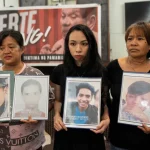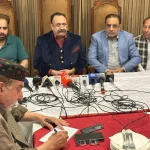Burned-out cars, rusted bullet casings and debris from levelled buildings line the narrow, winding streets of Mukalla, a jarring reminder of the intense fighting that ravaged the seaport nearly three years ago.
In a blitzkrieg similar to when the Islamic State of Iraq and the Levant (ISIL, also known as ISIS) surged across Syria and Iraq, hundreds of fighters from al-Qaeda in the Arabian Peninsula (AQAP) overran Yemen’s coastal city of Mukalla in April 2015, exploiting chaos unleashed by the Saudi-led coalition’s war with Houthi rebels in the north.
The ensuing turmoil, which has killed and wounded more than 60,000 people since March 2015, presented AQAP with an opportunity to make huge territorial gains, thanks partly to the acerbic, sectarian tone espoused by the coalition.
The Houthis, a group of rebels who emerged from Yemen’s northern highlands where Zaidi Shia Muslims are concentrated, allied with troops loyal to former President Ali Abdullah Saleh in early 2015, capturing large expanses of the country, including the capital, Sanaa.
Saudi Arabia and a coalition of Sunni Arab states intervened in the conflict in March of that year, launching a massive aerial campaign to restore President Abd-Rabbu Mansour Hadi’s internationally recognised government which was forced into exile.
Air strikes decimated areas held by the Houthis, dislodging them from most of the south. However, until today, the rebels control a section of land larger than England, ruling a population of around 18 million people.
AQAP exploited this chaotic milieu to attack Mukalla on April 2, 2015, a city of more than 300,000 people, pounding military installations with mortars and RPGs they had seized in previous battles.
The Yemeni military spectacularly crumbled.
Troops were unable to repel AQAP’s advance and dumped their weapons and even their uniforms, fleeing through arid valleys and deserts to government-controlled areas to the west of Hadramout province.
With military bases left undefended, AQAP came to acquire some of the world’s most fearsome weapons – seizing tanks, American-made Humvee vehicles and copious heavy weaponry as spoils of war.
 |
| A destroyed anti-tank gun is seen outside the traffic management compound in Mukalla’s Joul Masha district [Rashed Bn Shbraq/Al Jazeera] |
But mighty war machines were not the only things AQAP got their hands on. The group also looted around $100m from local banks, and would later use these funds to launch a cynical public relations campaign to shore up support for their so-called Islamic Emirate.
Raking in around $2m a day by extorting national companies and taxing goods coming into the lucrative port, AQAP used its growing economic power to provide residents with drinking water, electricity, healthcare and other basic services.
The group abolished taxes on local residents, paid civil servants their salaries on time and went about making slick propaganda videos in which they boasted about their state-building project as a “liberation” movement.
|
|
But exactly a year later, they gave it all up, in a sudden, bloodless withdrawal.
Yemeni soldiers, backed by Emirati special forces, entered the city on April 24, 2016 after AQAP withdrew, following secret negotiations, to the rugged mountains of Shabwa, al-Bayda and Marib provinces.
The group, which has long boasted about preparing its soldiers for “martyrdom”, said it fled to protect civilians from advancing forces.
Only a handful of its fighters remained, blending into the local population.
Now, nearly two years on, residents have told Al Jazeera that the Yemeni government and their Emirati handlers failed to provide them with the most basic of services, with their lives having been “better” under the armed group.
Life under AQAP
“Al-Qaeda paved roads, built hospitals. It was far from perfect, but they were better than the current administration,” said Abdur Rahman Khaled, a 30-year-old fisherman from Mukalla’s Khalaf district.
“When they set up their administrative council, it was headed by prominent tribal elders who didn’t ascribe to their ideology. So they weren’t this group of power-hungry jihadists that the media portrays.
“They were forced to fill a void left by the cowardly army and government when they fled,” Khaled said.
In a view echoed by several other residents, Khaled added: “Life was better under al-Qaeda, compared with now. Now it’s just a mess.”
Many of AQAP’s leaders hailed from established Hadrami families, and the group even rebranded themselves as the “Sons of Hadramout” to sidestep local and international stigma.
Despite employing a deadly campaign of suicide bombings against state authorities since the late 1990s, AQAP in Mukalla was “less cruel” than the image touted in the media, Khaled said.
“While they resorted to the stoning of at least one man and woman accused of adultery, as well as the crucifixions of two men suspected of being Saudi spies, such incidents were rare.”
Glimpses of life under AQAP are still evident on the streets, Khaled added, with the groups’ slogans still hanging on buildings and graffitied on walls.
Under AQAP, Hisbah (religious police) walked the city’s streets, supervising the implementation of their interpretation of the Shariah, where free-mixing between the sexes was forbidden and music was banned.
“Women of faith: Protect your pure bodies from prying eyes,” one poster hanging at a busy junction reads.
 |
| Clashes have damaged historical sites and buildings throughout the country, including the Balfaqeeh Cultural Center in Fouah [Rashed Bn Shbraq/Al Jazeera] |
Sewage and debris-caked roads
Charred buildings and crumpled cars are also a frequent sight, but with electricity still not fully restored after a coalition air strike flattened a power plant in 2016, most of the city is shrouded in darkness at night.
Residents complained to Al Jazeera of the nauseating stench of sewage fermenting in the hot climate, saying it could be smelled from “hundreds of metres away”.
“The city is drowning in sewage and darkness,” Afkar Alshanbati, a local resident and human rights activist, told Al Jazeera.
Water treatment and distribution facilities are constantly disrupted by power shortages, she said, with the government always avoiding blame with “lame excuses.
“The situation is unacceptable and reflects the ignominious failure of the local authority,” Alshanbati said.
“Mukalla was liberated nearly two years ago, yet nothing has been done to repair buildings.”
Fingers have been pointed at both AQAP and the Saudi-led coalition for the devastation, but, wherever the blame lies, entire areas are unlikely to be repaired anytime soon, she said.
“We understand that there is a war, but the government should pay employees their salaries, especially in ‘liberated’ areas. But it’s one excuse after the next, under the pretext of the war,” Alshanbati added.
Residents also told Al Jazeera that the government’s refusal to allocate funds to repair destroyed pipes was heightening tensions in some neighbourhoods, where raw sewage would flow through the streets into peoples’ homes.
Last year, a wave of cholera cases further devastated the population, infecting more than a million Yemenis and killing at least 2,200.
The rapid spread of the disease was largely due to the collapse of sanitation infrastructure, the WHO said, after rubbish collection services ceased and sewage pipes were ruptured by air strikes.
President Hadi’s government refused to comment to Al Jazeera on the issue.
 |
| A taxi tries to drive along a narrow road in Mukalla full of rubbish and sewage [Rashed Bn Shbraq/Al Jazeera] |
Absent government
While some residents blamed Yemeni authorities for the slow rebuilding effort, a local official said there had been little financial support from the UN and international charities.
“The president is in exile, and members of his government are based in Aden, that’s why we’ve had difficulties in repairing the city,” said Riyadh al-Jareeri, director of Mukalla’s health office.
Hadi and much of his inner circle – his sons, aides and military officials – have been based in Riyadh since 2015 and made only sporadic visits to Aden.
“The government has reduced its operational budget by 70 percent since March 2015, and international donors are concerned about the security situation when it comes to repairing destroyed buildings – they don’t want to risk their money going to waste.
“Donors are wary that if they repair buildings, they may be targeted again,” al-Jareeri added.
Mukalla airport has been shut to commercial flights since AQAP’s takeover, with only sporadic aid deliveries arriving since then.
“Since the closure of Mukalla airport, international journeys have become exhausting,” said Salim Saeed, a Mukalla resident.
“First we have to travel 360km north to Seiyoun, then wait and hope our flights are confirmed.
“It’s a more arduous trip than flying from Seiyoun to Amman”, he added.
The economic situation for Yemenis has also worsened since Hadi’s government relocated the Central Bank from Houthi-held Sanaa to Aden, a move aimed at dealing the rebels an economic blow.
The repercussions, however, have affected all public sector workers, with medical personnel and teachers rarely getting paid their salaries, leaving more than a million state employees and their families without a regular income.
Abu Mohammed, a 31-year-old bus driver, said a shortage of fuel, caused by a recent Saudi-led blockade, meant he had to queue for days to fill his bus, often sleeping in his car as crime had surged since police refused to patrol the streets.
“I don’t go home, I spend days at the gas station. I sleep at the gas station. I can’t sleep at home because it’s not safe for my bus to be left alone,” he told Al Jazeera.
“This is the worst fuel crisis we’ve ever witnessed. Life under AQAP was so much easier in terms of receiving fuel supplies.”
 |
| A military compound in Khalaf is still out of operation nearly two years after the fighting ended [Rashed Bn Shbraq/Al Jazeera] |
‘Life of misery’
The UAE’s role in rebuilding the Yemeni army has also deepened resentment in the city.
While Saudi Arabia has expressed it “wants out” of Yemen, the UAE has become more involved in the conflict, indicating a divide in the two countries’ agendas.
The oil-rich Emirates has been at the heart of a series of dramatic events and shifting alliances over the past two years, including Hadi’s inability to return to Aden, and the UAE’s unabashed support for the southern secessionist movement.
But it was the UAE’s decision to fund and direct a “Security Belt” – a force created in 2016 that has been responsible for arbitrarily detaining and abducting people, that has caused the most outrage.
Human Rights Watch has accused Abu Dhabi of carrying out grave human rights violations during security operations against AQAP and the local ISIL affiliate.
Scores of people have forcibly disappeared, subject to heavy beatings, sexual assaults and threats to their family members, in secret prisons it administers, it said.
While Yemeni forces backed by the UAE have prevented any major AQAP advances, the image of nervous Yemeni soldiers manning checkpoints highlights the daunting task ahead.
Just like across much of Yemen, where the nearly three years of war has caused widespread misery, Abu Mohammed says he knows he’s among the relatively fortunate.
“I used to have a good life, but now I, like most Yemenis, barely earn enough to make ends meet,” he said.
While his rent has almost doubled, and his family struggles to cook regular meals, he knows he’s not among the more than eight million people who are a “step away from famine”.
The country’s already inflated food and fuel prices have skyrocketed, further hurting already impoverished families.
With his doting wife and two children bringing him some semblance of peace and comfort, the prospect of having a third child is what keeps him awake most nights, he says.
“Two children are enough for me. My wife knows this and is taking drugs to avoid pregnancy.”
With the civil war showing no signs of ending, the legacy of the fighting will be felt for generations, he says.
“Life was once good, now … it’s only misery we’ll know.”
Faisal Edroos reported from Doha, Saleh Al-Batati reported from Mukalla. Follow them on Twitter: @FaisalEdroos, @SalehAlBatati1
|
|








